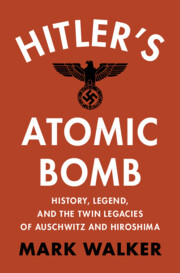Book contents
- Hitler’s Atomic Bomb
- Hitler’s Atomic Bomb
- Copyright page
- Dedication
- Contents
- Figures
- Preface
- Acknowledgments
- Abbreviations
- Introduction
- Part I The Bomb
- 1 Farm Hall
- 2 Nuclear Fission
- 3 Lightning War
- 4 Selling Uranium
- 5 Total War
- 6 The War is Lost
- Part II Living with the Bomb
- Glossary
- Notes
- Archives
- Bibliography
- Index
- Hitler’s Atomic Bomb
- Hitler’s Atomic Bomb
- Copyright page
- Dedication
- Contents
- Figures
- Preface
- Acknowledgments
- Abbreviations
- Introduction
- Part I The Bomb
- 1 Farm Hall
- 2 Nuclear Fission
- 3 Lightning War
- 4 Selling Uranium
- 5 Total War
- 6 The War is Lost
- Part II Living with the Bomb
- Glossary
- Notes
- Archives
- Bibliography
- Index
Summary
When the war slowed down in the winter of 1942-1942, the uranium research was evaluated with the result that it became clear that atomic bombs could not be made in Germany in time to influence the outcome of the war. The project was transferred from Army Ordnance to the Reich Research Council, the institution responsible for mobilizing civilian research for the war effort. The scientists, who were now threatened with the loss of their exemptions from frontline service, began to “sell” their research. Although they did not promise to deliver atomic bombs, they did emphasize the tremendous power of such weapons and warned that the Americans, who had much greater resources, were apparently working on this. In the meantime a model nuclear reactor experiment had produced a neutron increase, which was interpreted as proof in principle that a nuclear reactor could be built. Several influential figures responsible for armament production now took a keen interest in uranium research and the powerful Minister of Armaments Albert Speer decided to generously support the project.
- Type
- Chapter
- Information
- Hitler's Atomic BombHistory, Legend, and the Twin Legacies of Auschwitz and Hiroshima, pp. 48 - 76Publisher: Cambridge University PressPrint publication year: 2024



